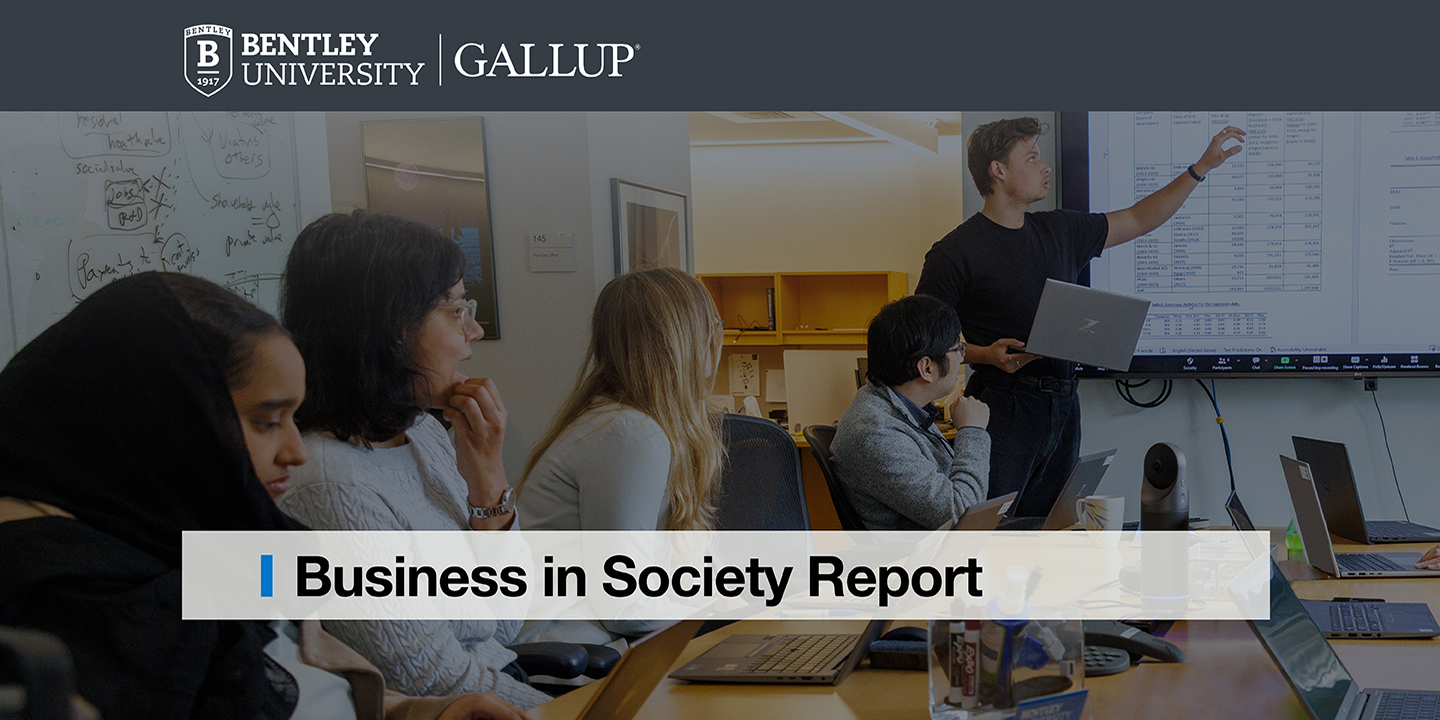
New Bentley-Gallup Report Shows Public Desire for Businesses to Speak Out Hits New Low
For the third year, Bentley University and Gallup have partnered to quantify Americans’ attitudes toward businesses and the impact businesses have on individuals and society. The 2024 Bentley-Gallup Business in Society report shows that for the third consecutive year, a majority of Americans continue to see businesses as having a positive effect on people’s lives.
Additionally, the report builds upon insights from previous years such as the role of business in society, the public’s views on companies’ political involvement and endorsements, and the use of artificial intelligence (AI).
The 2024 results are based on a Gallup poll of 5,835 U.S. adults, aged 18 or older, conducted from April 29 to May 6, 2024.
“I’m a firm believer in the power of business and its potential to improve the lives of customers, employees and shareholders,” says Bentley University President E. LaBrent Chrite. “The Bentley-Gallup Business in Society report reveals Americans’ changing expectations for the corporate world and will help companies better understand how they can harness the potential of good business to have a positive impact on society.”
Bentley-Gallup Business in Society 2024 Report

Key findings from this year include:
Positive Impact of Businesses
63% of Americans see businesses as having a somewhat positive (41%) or extremely positive (22%) impact on people’s lives. This 63% is unchanged from 2023 but is an eight-percentage-point improvement over 2022, when 55% of Americans reported the same.
Priorities and Performance
- When it comes to the top priorities for businesses, Americans attach the highest importance to making money in ethical ways (79%) and providing high-quality healthcare benefits to employees (71%).
- Smaller majorities believe it is extremely important for businesses to offer mental health benefits (56%), avoid major pay gaps between CEOs and workers (56%) and offer flexible work arrangements (52%).
- Less than half of Americans think businesses are doing an excellent or good job in these areas or any of the other areas they were asked about.
Political Involvement
- Support for businesses taking a public stance on current events continued to wane in 2024: 38% of Americans say businesses should take a public stance, down from 41% in 2023 and 48% in 2022.
At least half of Americans are interested in businesses taking a stance on climate change (54%), mental health (53%) and diversity, equity and inclusion (53%).
- About three-quarters of Americans believe businesses have some (44%) or a lot (32%) of influence on presidential elections, but only 17% want them to take a public stance on political candidates.
- Political endorsements may drive away more customers than they attract. More than six in 10 Democrats and Republicans (68% and 61%, respectively) say they would be less likely to purchase from a company that endorsed a candidate from the opposing party.
Concerns about Artificial Intelligence
The percentage of adults who believe AI is more harmful than helpful has decreased from 40% in 2023 to 31% in 2024, driven mainly by Americans over 30.
Three-quarters of Americans believe AI will reduce the total number of jobs in the country over the next 10 years, and 77% do not trust businesses much or at all to use AI responsibly. Neither measure has improved since 2023.
- However, 57% of Americans say businesses could reduce their concerns about AI by being transparent about its use.
- Those most knowledgeable about AI are still more likely to believe it does more harm than good (31% to 22%).
“As Americans are becoming more familiar with artificial intelligence, we see concerns about its harmfulness have decreased,” says Stephanie Marken, Senior Partner at Gallup. “Still, most Americans remain concerned about the impact of AI on jobs, and are worried businesses may not use AI responsibly, signaling companies need to be transparent about AI use and its purpose in their business.”
About the Survey
The 2024 Bentley-Gallup Business in Society study is based on a Gallup Panel web survey completed by 5,835 adults in the U.S., aged 18 and older, conducted April 29 to May 6, 2024. The Gallup Panel is a probability-based longitudinal panel of U.S. adults whom Gallup selects using random-digit-dial phone interviews that cover landlines and cellphones. Gallup also uses address-based sampling methods to recruit Panel members. The Gallup Panel is not an opt-in panel.
The sample for this study was weighted to be demographically representative of the U.S. adult population, using the most recent Current Population Survey figures.
For results based on this sample, the margin of sampling error at the 95% confidence level is ±2.1 percentage points for response percentages around 50% and is ±1.3 percentage points for response percentages around 10% or 90%, design effect included. Margins of error are larger for subsamples.

